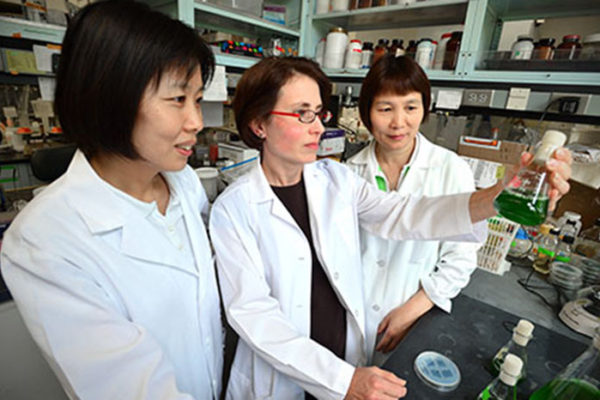Creating plants that make their own fertilizer
Much of modern agriculture relies on biologically
available nitrogenous compounds (called “fixed” nitrogen) made by an
industrial process developed by German chemist Fritz Haber in 1909. Himadri Pakrasi, PhD, a scientist at Washington University in St. Louis, thinks it should be possible to design a better
nitrogen-fixing system. His idea is to put the apparatus for fixing
nitrogen in plant cells, the same cells that hold the apparatus for
capturing the energy in sunlight. The National Science Foundation just awarded Pakrasi and his team $3.87 million to explore this idea further.
Receptor may aid spread of Alzheimer’s and Parkinson’s in brain
School of Medicine
scientists have found a way that corrupted, disease-causing proteins
spread in the brain, potentially contributing to Alzheimer’s disease,
Parkinson’s disease and other brain-damaging disorders. Pictured are clumps of corrupted tau protein outside a nerve cell, as seen through an electron micrograph.
Lab-made complexes are “sun sponges”
In the Aug. 6, 2013, online edition of Chemical Science, a team of scientists describes a testbed for light-harvesting antennas, the structures that capture the sun’s light in plants and bacteria. Prototype designs built on the testbed soak up more of the sun’s spectrum and are far easier to assemble than synthetic antennas made entirely from scratch. They offer the best of both worlds, combining human synthetic ingenuity with the repertoire of robust chemical machinery selected by evolution.
Alcohol abuse, eating disorders share genetic link
Part of the risk for alcohol dependence is genetic. The same is true for eating disorders. Now, School of Medicine researchers have found that some of the same genes likely are involved in both. They report that people with alcohol dependence may be more genetically susceptible to certain types of eating disorders and vice versa.
Green Rehab project promotes a more sustainable university
An interdisciplinary team of researchers and
students from the School of Engineering and Applied Science, the Sam Fox
School of Design & Visual Arts and Olin Business School at
Washington University in St. Louis is working to create a more sustainable future for the university. Over
the last year, teams have developed an experimental framework for
testing environmentally friendly redevelopment strategies in a group of
University-owned apartment buildings north of the Delmar Loop.
WUSTL bucks global trend in female entrepreneurship
A recent report from the Global Entrepreneurship Monitor indicates that there are significantly fewer female entrepreneurs than male entrepreneurs around the world. This is not the case, however, at Washington University in St. Louis, where more than 40 percent of successful companies started by recent graduates through the university’s business
entrepreneurship courses have been founded by women.
Bear Beginnings: Orientation by the numbers
4,000 glow sticks, 50 academic progams, 100 First 40 events make the start of the school year special for new students.
Q&A: Heather Corcoran on health, wellness and interaction design
There is programming capacity, and then there are the ways people actually process information. As anyone still convalescing from a software update might tell you, these are not necessarily the same things. We sat down with Heather Corcoran to discuss the emerging field of “interaction design,” which emphasizes the importance of the user experience.
Media Advisory: Washington University first-year students move in Thursday
Washington University’s main move-in day in the South 40 residence halls for new students is Thursday, Aug. 22. Some 1,600 new students (freshmen, transfer and exchange) are arriving for the 2013-14 academic year that begins Aug. 27. Chancellor Mark S. Wrighton will lead university staff members and upperclass student volunteers in a 7:30 a.m. pep rally as they prepare to welcome the new students and assist with move in throughout the day.
Red blood cell transfusions in children focus of $7.8 million grant
The School of Medicine has received a $7.8 million grant to determine whether the length of time red blood cells (RBCs) are stored affects organ failure in critically ill children who receive RBC transfusions. Pictured is Philip Spinella, MD, one of study’s principal investigators, with Ronald Jackups, MD, PhD, in the blood bank at St. Louis Children’s Hospital.
View More Stories


